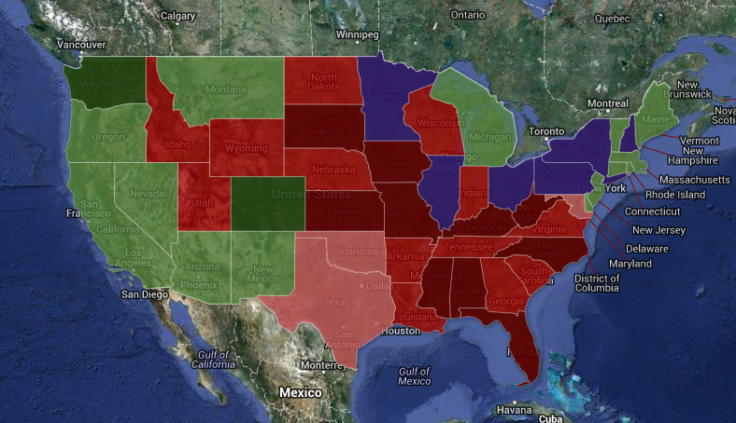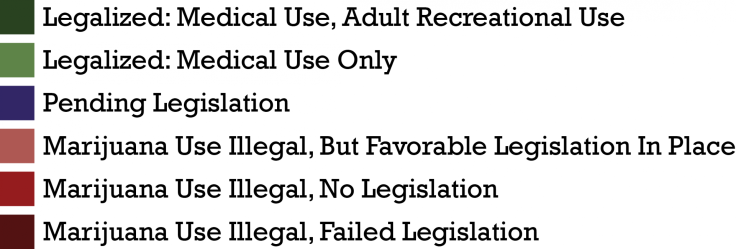The Future Of Cannabis Legislation
In his dapper black suit, matching derby and braids, Steve DeAngelo looks like a cross between a British banker and an aging hippie. That, like so much about DeAngelo, is by design: He inhabits two worlds that don't often overlap, and which require entirely different kinds of cred: one in which value is measured in dollars, and another in which the use of cannabis could, you know, save the world.

In some ways DeAngelo also personifies the ongoing evolution of American views on marijuana laws, which are viewed as long overdue, and presenting new economic and health care opportunities, or, alternatively, as the final triumph of reefer madness.
Like so much in the U.S., differences of opinion on marijuana use are, for now, easily reduced to red and blue on the map. And even within the legalization effort, the semantics are subject to debate. Is the appropriate term cannabis, marijuana or... weed?
Currently, 18 states and Washington, D.C., have approved legislation legalizing medical use of cannabis, and several others are considering doing so. Two states, Colorado and Washington, have also legalized recreational use. While medical use is at the forefront, there is a tandem focus on money to be made, at least from DeAngelo's vantage point as president of ArcView Group, an investor network working within the medical cannabis industry.
At ArcView Group’s recent quarterly forum, held in New York last Friday, entrepreneurs pitched medical cannabis-related proposals to investors considering putting money into this growing industry. San Francisco-based ArcView and its coterie of cannabis entrepreneurs claim the industry is about to explode, with the potential to generate millions in profits. But DeAngelo concedes that requires changes to laws governing the production, transportation and use of marijuana, and, for that matter, in how people talk about it (he strictly uses the term cannabis rather than "pot," "weed" or "marijuana," which can be associated with stoner culture).


Click here for the full interactive map of cannabis legislation.
At the ArcView forum, DeAngelo likewise described a scenario where the potential for business spurs legal change. By linking investors to entrepreneurs, cannabis can be tied to finance and the debate can focus more on economic development than morality. “I think one day, when you see the change in federal law that we all know is going to come, we will see a flood of investment happening into this sector, and I think that day will come soon,” DeAngelo said. In his opinion, the economic benefits will ensure that medical cannabis in particular will be legalized in the majority of states.
DeAngelo, a cannabis advocate, claims there are numerous societal benefits associated with legalization. “There will be other collateral benefits to our society which are going to be very, very valuable in improving public safety, by redirecting law enforcement resources to real crimes and real criminals,” he said, continuing, “and by improving public health by introducing new cures for diseases like cancer, epilepsy and alternatives, natural and safe alternatives to dangerous pharmaceuticals.”
The effect of cannabis legislation goes beyond usage and into manufacturing. Hemp has to be imported because it's illegal to grow it within the United States without a permit from the Drug Enforcement Agency, or DEA, which is extremely difficult to get. States such as Colorado and Oregon have legislation in place to grow hemp, but much like with marijuana, it is still illegal under federal law. While it is technically the same type of plant that produces marijuana, hemp has almost none of the psychoactive elements found in cannabis.
Hemp could help improve the environment while providing a source of revenue for the agricultural industry and, according to DeAngelo, it could be an industrial raw material "for about 25,000 different things.”
Also on hand at the ArcView forum were representatives of the National Cannabis Industry Association, who were in New York to raise money for lobbying efforts in Washington, D.C.
Betty Aldworth, deputy director of the NCIA, said, “What we see is the development of a brand-new regulated system out of nothing. We’re taking an underground market and placing it behind the counter and we’re saying, ‘Let’s tax and regulate this product and let’s let businesses handle this product that’s been so long handled by cartels and criminals.’"
Despite the lack of precedent, with other underground markets becoming taxed and regulated business, Aldworth says there are parallels in the medical world. “It is very challenging to write these new laws, essentially from scratch, in order to regulate this product properly, although we have great analogues of other products,” Aldworth said. “There are medical products that are regulated, there are adult-use products that are regulated and we can look at how we handle those products and apply some of those rules to marijuana.”
New states looking to pass legislation are beginning to look at other states for guidance and establishing measures that are similar to previously passed laws. “As new states are bringing their laws onboard, they are looking to other states, looking to what works in Colorado, or Arizona, or Washington or other places and developing something that works for them," Aldworth said. "Many of the laws that we see passing now -- whether it be Massachusetts in 2012, or Nevada, which was just signed by the governor, or Illinois, which is on the governor’s desk -- each of those laws is taking the lessons learned in other states and applying them to their home state.”
The biggest roadblock to the cannabis industry is, obviously, the fact that it is illegal in most states. There are also the potential specters of high taxation and federal seizure, even for legitimate enterprises. “One of the challenges we face as an industry is it is sometimes perceived that we are talking about tax breaks. But in fact we are not talking about tax breaks; we are talking about being treated like any other business,” Aldworth said. “As of right now, cannabis businesses are paying between 60 and 85 percent for effective small-business taxes and most small business are paying between 15 and 35 percent. We would like to be closer to those other small businesses, but we want to be taxed and regulated.”
Harborside and Berkeley Patient Group are not allowed normal deductions for businesses under Internal Revenue Code section 280E. According to IRS law, “No deduction or credit shall be allowed for any amount paid or incurred during the taxable year in carrying on any trade or business if such trade or business (or the activities which comprise such trade or business) consists of trafficking in controlled substances (within the meaning of schedule I and II of the Controlled Substances Act), which is prohibited by Federal law or the law of any State in which such trade or business is conducted.”
Even when dispensaries are following the law, there is the potential for federal intervention. Harborside Health Center, of which DeAngelo is the CEO, and the Berkeley Patient Group are facing lawsuits for the forfeiture of their businesses and assets. While the businesses face federal opposition, they are welcomed community members. “Both... are facing civil asset forfeiture, despite the fact they are locally licensed and very much appreciated by their local government. The City of Oakland and the City of Berkeley are standing up behind these businesses and saying, ‘Hey, we want them here, so federal government, please don’t interfere with our local ability to regulate these businesses,’” Aldworth said.
The semantics are important when trying to convince people that even medical marijuana use is acceptable, Aldwoth said. “There is a lot of old fear about a regulated marijuana marked based on nonfactual information, but as we are able to sit down with legislators, as we’re able to sit down with decision-makers and as we’re able to work with the American public to demonstrate regulated marijuana is a much better option than allowing businesses and nonprofits control this very popular product, we are finding more and more are coming around to the idea that it’s time to tax and regulate."
For many of the presenters and entrepreneurs at the ArcView forum, the desire to change the culture stems from personal experiences. Matt Luxton, Royght! founder, is presenting the Halo, an adjustable water pipe that fits into a coffee cup. “I invented it initially for a woman I knew who we were renting space from, who did have a bong and used medical cannabis for chronic pain," he explained. "She was in her 70s, but she was embarrassed by it and her kids had moved back and her grandchildren were living with her and she was smoking out of a little aluminum tube and it was painful for her. There needs to be something for her, something for these people.”
Luxton jokes around, saying he knows a vice president of a large company that has his son get cannabis, but he understands that the discourse needs to change even while he contends the old culture and stigma will never be completely erased. He also believes that medical cannabis can be an alternative to opioids prescribed for chronic pain. He relates a story about a father figure in his life, “The other end of the issue is the medical tide where opioids and continued use of pain medications are quickly becoming one of the leading causes of death. I have a personal friend, who was like a father to me growing up, he recently passed away after six years of chronic pain, he passed away in his sleep and it was very little doubt it was the medication, his body was depressed and his heart stopped.
“It’s terrible, but it happens every day, and when I talk to people about it, I hear other stories," Luxton said. "The reason this is not being used for medicine is, as it very well should be, just that, the stigma. The stigma is going to stick around as long as the old culture is around. I don’t think we’ll ever get rid of it. Cheech and Chong will always be hilarious, but we need to step into an era where cannabis can be sophisticated, where it can be fun and it is an adult endeavor but it is an endeavor you can choose.”
© Copyright IBTimes 2024. All rights reserved.






















